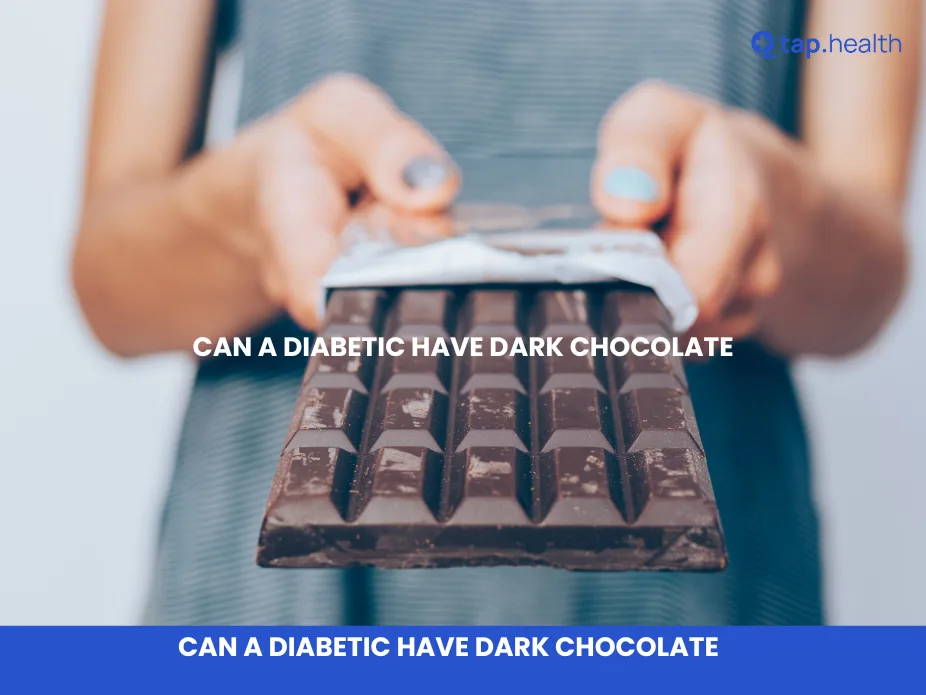For many people with diabetes, the thought of eating chocolate can feel like a forbidden treat. But what about dark chocolate? It’s often touted for its health benefits, but how does it affect blood sugar levels, and can it be part of a healthy diabetic diet?
The answer might surprise you: Yes, diabetics can enjoy dark chocolate in moderation, and it may even provide some health benefits. However, like with all foods, portion control and choice of chocolate are key.
In this article, we’ll explore whether dark chocolate is good for diabetics, how it can be safely enjoyed, and the research-backed facts that can help you make informed choices. We will also offer expert opinions and real-life examples to help you navigate your sweet tooth without compromising your health.
What Is Dark Chocolate?
Before diving into whether dark chocolate is suitable for diabetics, it’s important to know what it is.
Dark chocolate typically contains a higher percentage of cocoa (ranging from 50% to 90%) and less sugar than milk chocolate. The higher the cocoa content, the lower the sugar content, which is why dark chocolate is considered a healthier option for most people. Dark chocolate is also rich in antioxidants, especially flavonoids, which contribute to its potential health benefits.
For diabetics, the key is to choose dark chocolate that has at least 70% cocoa or higher. This ensures that the chocolate has less sugar, and more of the beneficial compounds like antioxidants and fiber.
Health Benefits of Dark Chocolate for Diabetics
While diabetes is a condition that requires careful dietary management, dark chocolate can still offer some health perks. Here’s why:
1. Rich in Antioxidants
Dark chocolate is packed with flavonoids—a type of antioxidant that has been shown to improve heart health and reduce inflammation. These antioxidants may help reduce the risk of cardiovascular disease, which is a significant concern for people with diabetes.
For example, studies suggest that flavonoids can help lower blood pressure and improve blood vessel function, both of which are critical for people with diabetes who are at higher risk for heart disease.
2. Improves Insulin Sensitivity
Insulin sensitivity refers to how effectively the body uses insulin to lower blood sugar levels. Research suggests that dark chocolate may actually help improve insulin sensitivity due to the flavonoids in cocoa. By increasing insulin sensitivity, dark chocolate can help the body better regulate blood sugar levels.
One study published in the American Journal of Clinical Nutrition found that regular consumption of dark chocolate (with high cocoa content) helped improve insulin sensitivity in people with type 2 diabetes. This means that a small piece of dark chocolate could, in theory, help control blood sugar.
3. Supports Brain Health
Another benefit of dark chocolate for diabetics is its potential to boost brain function. The flavonoids in dark chocolate are believed to increase blood flow to the brain, which may help improve cognitive function. For those with diabetes, this can be an important factor since they are at an increased risk for cognitive decline and memory problems.
Real-Life Scenario: Shreya’s Sweet Discovery
Shreya, a 32-year-old woman from Bangalore, was diagnosed with type 2 diabetes a year ago. One of the hardest things for her was giving up her beloved sweet treats. But after reading about the health benefits of dark chocolate, she decided to give it a try.
Shreya started by replacing her usual milk chocolate bar with a small square of dark chocolate (70% cocoa). After a few weeks, she noticed that not only did it satisfy her cravings, but it also didn’t spike her blood sugar as much as her regular chocolate had. She also found that dark chocolate kept her fuller for longer, reducing the temptation to snack on high-carb foods.
Shreya’s story is a great example of how dark chocolate, when consumed in moderation, can become a healthier choice for people with diabetes.
The Risks of Eating Dark Chocolate for Diabetics
While dark chocolate has health benefits, it’s essential to understand its potential risks for diabetics as well.
1. High in Calories
Even though dark chocolate has fewer sugars than milk chocolate, it can still be high in calories. A small serving can pack a significant amount of calories, and consuming too much can lead to weight gain. For people with diabetes, maintaining a healthy weight is crucial for managing blood sugar levels.
To avoid overindulgence, keep portion sizes small and opt for small squares or a single bite-sized piece.
2. Potential Added Sugar
Not all dark chocolate is created equal. Some brands add more sugar or sweeteners to enhance the taste, which can negate some of the health benefits. Always check the ingredient list and choose dark chocolate that has at least 70% cocoa content. This ensures that you’re getting a product that is low in added sugars.
Additionally, sugar substitutes like stevia or erythritol may be a better option for people with diabetes looking to satisfy their sweet cravings without spiking blood sugar.
3. It May Cause a Blood Sugar Spike (If Overconsumed)
Although dark chocolate has a low glycemic index compared to other sweets, overconsumption can still cause a blood sugar spike. It’s important for diabetics to eat dark chocolate in small portions and as part of a balanced meal to avoid spiking blood sugar.
Expert Contribution: Dr. Ramesh Kumar’s Advice on Dark Chocolate and Diabetes
Dr. Ramesh Kumar, a prominent nutritionist based in Delhi, emphasizes that moderation is key when consuming dark chocolate. He explains:
“Dark chocolate is a great option for diabetics because of its low glycemic index and high levels of antioxidants. However, it’s crucial to eat it in moderation and opt for varieties with 70% or more cocoa content. If consumed wisely, dark chocolate can be a satisfying and health-promoting treat for diabetics.”
Dr. Kumar also advises that diabetics who are concerned about the sugar content in chocolate can experiment with sugar-free or low-carb options, especially for those managing blood sugar levels closely.
For more insights on diabetes-friendly snacks, check out How Many Carbs for a Bedtime Snack with Gestational Diabetes?.
How to Safely Enjoy Dark Chocolate as a Diabetic
If you’re wondering how to include dark chocolate in your diabetes-friendly diet, here are some practical tips:
1. Opt for Dark Chocolate with 70% or Higher Cocoa
The higher the cocoa percentage, the less sugar the chocolate contains. Aim for dark chocolate with at least 70% cocoa to maximize the health benefits while minimizing sugar.
2. Watch Your Portions
Keep your servings small—about 1 ounce (28 grams)—to prevent consuming too many calories or sugars. A little goes a long way when it comes to enjoying the flavor of dark chocolate.
3. Pair with Other Foods
To balance the effects on blood sugar, pair dark chocolate with fiber-rich or protein-rich foods like nuts, seeds, or fruit. This can help slow down the absorption of sugar and prevent a sudden blood sugar spike.
4. Choose Dark Chocolate with Minimal Additives
Look for chocolate that is made with few additives and artificial sweeteners. The more natural the ingredients, the better it is for your health.
FAQs: Can a Diabetic Have Dark Chocolate?
Q1: How much dark chocolate can a diabetic eat per day?
Diabetics should aim for 1 ounce of dark chocolate (about 1–2 squares) per day, ideally with a cocoa content of 70% or higher. It’s important to control portions to avoid spiking blood sugar levels.
Q2: Is dark chocolate good for controlling blood sugar?
Yes, dark chocolate, especially with high cocoa content, has been shown to improve insulin sensitivity and may help regulate blood sugar when consumed in moderation.
Q3: Can dark chocolate raise blood sugar?
While dark chocolate has a low glycemic index, overconsumption can lead to blood sugar spikes, especially if it contains added sugars. Moderation is key.
Q4: Is sugar-free dark chocolate a good option for diabetics?
Yes, sugar-free dark chocolate can be a better option, as long as it’s made with safe sugar substitutes like stevia or erythritol. Always read the labels to avoid artificial additives.
Conclusion
Dark chocolate can be a delicious and healthful treat for diabetics when eaten in moderation. Packed with antioxidants and potentially beneficial for improving insulin sensitivity, dark chocolate offers several advantages for those managing diabetes. However, it’s important to be mindful of portion size and choose high-cocoa, low-sugar varieties to get the most benefits while minimizing the risks.
As with any food, consulting your healthcare provider before making changes to your diet is always a good idea. If you have a sweet tooth, dark chocolate could be your ticket to satisfying your cravings in a healthier way.



